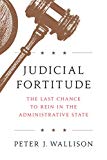Books Reviewed
The assault on the administrative state proceeds apace. Law schools and think tanks abound with seminars and conferences with titles such as “Whatever Shall We Do About the Administrative State?,” “Deregulation and the Administrative State,” and “Congress and the Administrative State: Delegation, Non-Delegation, and Un-Delegation.” Vigorous critiques like Philip Hamburger’s Is Administrative Law Unlawful? (2014), Joseph Postell’s Bureaucracy in America (2017), and John Marini’s new Unmasking the Administrative State receive thoughtful attention. Law reviews and public policy journals, not to mention numerous legal blogs, fairly bristle with commentary questioning virtually every conventional assumption of the once quiet and uncontroversial field of administrative law. Such developments will not instill confidence among those who believe public administration has yet to achieve its greatest glory.
Many mansions may be found in the house of the critics, but the differences among them pale compared with the shared conviction that the premises on which administrative law has rested for the better part of a century should be radically revised or abandoned. To be sure, numerous scholars who disagree with this indictment return the critics’ volleys with books and articles of their own. But the critics—at least at the present




